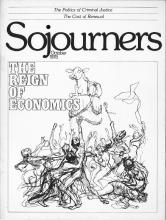"Come to me all you who labor and are heavy laden, and I will give you rest." -- Matthew 11:28
A good deal of attention has been devoted to the Evangelical wing of the church. Evangelicals, it would seem, are everywhere, not only preaching on street corners and in bus terminals, but also making their appearance on the covers of national news magazines, when they are not spilling out of our television sets. Reformed sinner Charles Colson can be seen standing side by side with reformed sinner Eldridge Cleaver, as together they intone a hymn. Evangelical churches flourish while mainline churches decline. A poor but honest millionaire peanut farmer named Jimmy Carter, who feels such a personal relationship with us all, tells a press conference how he formed "a very close, personal relationship" with Jesus Christ. And not long ago I walked through a reception line at a wedding only to be greeted by a middle-aged woman dressed in an impeccable suit bearing what seemed to be a diamond-studded pin on her lapel forming in capital letters, for all the world to see, the words "born again"--a term which is fast replacing "superstar" as the great honorific appellation of our time. No doubt this lady was one of the millions of reclaimed people in this country who like to read what Gore Vidal has called "those first-person confessions by washed-up celebrities who have found God."
Read the Full Article

